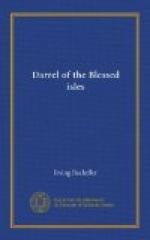He paused a moment as he neared the horse—a white and ancient palfrey. He stood thoughtfully on “cocked ankles,” every leg in a bandage, tail and mane braided,
“Get ap, Prince,” Tunk shouted, as he gave him a slap. Prince moved aside, betraying evidence of age and infirmity.
“But—” Tunk repeated with emphasis.
“Ugly?” the teacher queried.
“Ugly!” said Tunk, as if the word were all too feeble for the fact in hand. “Reg’lar hell on wheels!—that’s what he is. Look out! don’t git too nigh him. He ain’t no conscience—that hoss ain’t.”
“Is he fast?”
“Greased lightnin’!” said Tunk, shaking his head. “Won twenty-seven races.”
“You’re a good deal of a horseman, I take it.” said the teacher.
“Wal, some,” said he, expectorating thoughtfully. “But I don’t have no chance here. What d’ye ‘spect of a man livin,’ with them ol’ maids ?”
He seemed to have more contempt than his words would carry.
“Every night they lock me upstairs,” he continued with a look of injury; “they ain’t fit fer nobody t’ live with. Ain’t got no hoss but that dummed ol’ plug.”
He had forgotten his enthusiasm of the preceding moment. His intellect was a museum of freaks. Therein, Vanity was the prodigious fat man, Memory the dwarf, and Veracity the living skeleton. When Vanity rose to show himself, the others left the stage.
Tunk’s face had become suddenly thoughtful and morose. In truth, he was an arrant and amusing humbug. It has been said that children are all given to lying in some degree, but seeing the folly of it in good time, if, indeed, they are not convinced of its wickedness, train tongue and feeling into the way of truth. The respect for truth that is the beginning of wisdom had not come to Tunk. He continued to lie with the cheerful inconsistency of a child. The’ hero of his youth had been a certain driver of trotting horses, who had a limp and a leaning shoulder. In Tunk, the limp and the leaning shoulder were an attainment that had come of no sudden wrench. Such is the power of example, he admired, then imitated, and at last acquired them. One cannot help thinking what graces of character and person a like persistency would have brought to him. But Tunk had equipped himself with horsey heroism, adorning it to his own fancy. He had never been kicked, he had never driven a race or been hurled from a sulky at full speed. Prince, that ancient palfrey, was the most harmless of all creatures, and would long since have been put out of misery but for the tender consideration of his owners. And Tunk—well, they used to say of him, that if he had been truthful, he couldn’t have been alive.
“Sometime,” Trove thought, “his folly may bring confusion upon wise heads.”
XVII
An Event in the Rustic Museum
Sidney Trove sat talking a while with Miss Letitia. Miss S’mantha, unable longer to bear the unusual strain of danger and publicity, went away to bed soon after supper. Tunk Hosely came in with a candle about nine.




